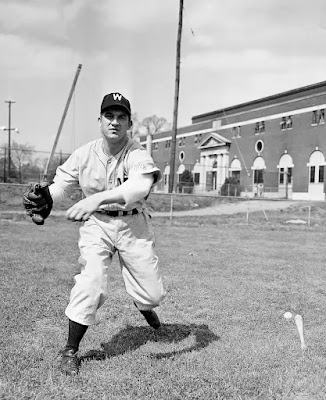With the baseball season right around the corner, I thought I'd share the story of a guy who made it to the major leagues against incredible odds. He only had one leg!
His name was Bert Shepard, and he was a pitcher, making his way through the minor leagues in the early 1940s when World War II service called him away. He was a fighter pilot, flying his P-38 Lightning over Germany when he was shot down on May 21, 1944. He crash-landed in a farm field and found himself surrounded by irate German farmers toting pitchforks, only to be saved by an Austrian named Ladislaus Loidl.
Bert wound up in a German hospital, unconscious, and with his right leg amputated below the knee. He left that hospital for a camp for wounded POWs, where a Canadian medic rigged up a makeshift artificial leg.
In February of 1945, he was back in the United States via a prisoner exchange, and was recuperating at Walter Reed General Hospital when the undersecretary of war, Robert P. Patterson, stopped by to visit him. Patterson asked him what he wanted to do once he returned to civilian life, and Shepard said he wanted to pitch again.
Patterson said, "Well, you can't do that, can you, now?"
Shepard said, "Yes, I can."
At the time, the DC Baseball team was the Senators, also called the Nats. Patterson, in more of a goodwill gesture than telling the team about a hot prospect, called the team owner, Clark W. Griffith, and told him the tale of the young man who just wanted a chance.
“This is the thing I dreamed about over there for months,” Bert told the press. “Sure I’m serious about playing ball and I believe that I can.”
“Hero of European Bombing, One Leg Off, Seeks Baseball Fame With Nats,” ran the eight-column headline in The Washington Post. Remember, manpower was short for baseball teams during the war. Pete Gray, a one-armed outfielder, played rather well in that 1945 for the St. Louis Browns, helping the team to the last winning record they would ever post before becoming the Baltimore Orioles in 1954.
That March of 1945 found Shepard in spring training with the Senators, and his tryout drew a lot of attention from the press and fans alike, so much so that he was given a contract as a coach, and kept around for pitching batting practice and appearing in exhibition games. He proved his worth quite well, and by the end of summer, he finally got the chance to pitch in a real major league game.
His turn came against the Red Sox on August 4. In the second game of a doubleheader, with Washington losing by 12 runs, Manager Ossie Bluege summoned Shepard from the bullpen to face George “Catfish” Metkovich (not to be confused with Jim "Catfish" Hunter), and Shepard struck him out, earning a standing ovation from the crowd of 13,000 home fans.
 And Shepard finished the game, in his only official major league appearance. He pitched five more innings, giving up just one run on three hits and a walk.
And Shepard finished the game, in his only official major league appearance. He pitched five more innings, giving up just one run on three hits and a walk.
After the season ended, Shepard toured army hospitals with the message that "a fellow with one leg or one arm isn’t necessarily relegated to the sedentary life." He even flew his own plane and let the other vets see him running a 60-yard dash and dribbling a basketball.
The next season, he didn't make the majors, with the top talent back from the front, and so he spent a couple more years trying to get back to the top by playing minor league ball, with no luck.
He said many times that if he had tried out for another team under an assumed name and found a way to conceal his prosthesis, he might have made it. Who knows? His story as is was fascinating enough for me.

No comments:
Post a Comment